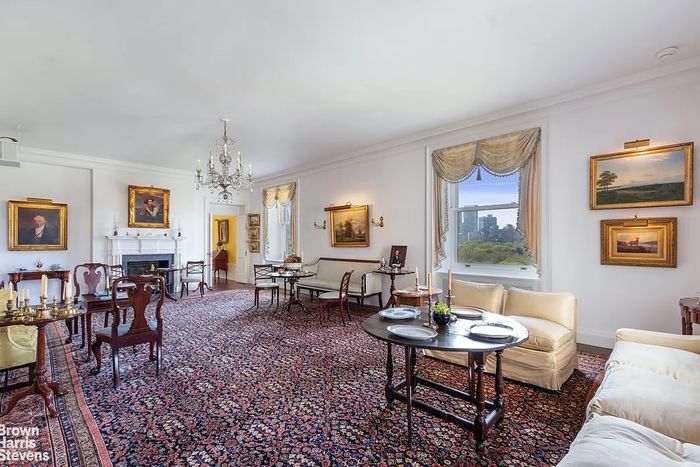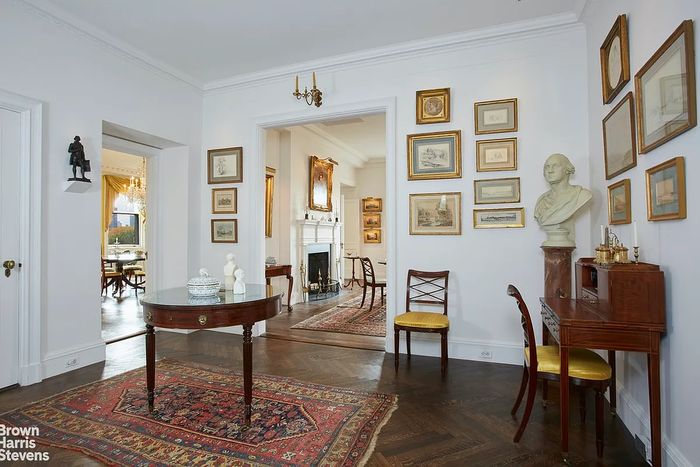Can I Buy a Co-op in NYC With an LLC?

The ninth floor apartment at 927 Fifth Avenue has much in common with other co-ops in elite old-line Upper East Side buildings: it’s palatial and elegant (it’s not just on the 9th floor, it is the 9th floor), with herringbone floors, direct Central Park views, and a patrician owner who’d lived there for the past 50 years (a few years back she discovered that a colonial-era drawing on her wall was a rare Revolutionary War sketch; it’s now in a museum). But unlike the other co-ops in the building, and indeed most other co-ops in New York, the apartment is now owned by a limited liability company, having sold to 927 Fifth LLC in December for $24.5 million. While corporate ownership has long been commonplace for luxury condos — 21 percent of all Manhattan condos are owned by LLCs, and the number is thought to be more than double that for luxury properties — they are exceedingly rare in co-ops, where boards, as a rule, won’t allow them. When I told Frederick Warburg Peters, the president emeritus of Coldwell Banker Warburg I was surprised to see an LLC sale at 927 Fifth, he replied: “Me too.”
While boards have become a little more lenient about things like trusts over the last few decades, LLCs have historically been an absolute non-starter: at the best co-ops, getting in means divulging a huge amount of financial and personal information, proving not only that you are the kind of person who can afford to live there, but the kind of person who deserves to. And that has not, traditionally, been the kind of person who hides their identity behind an LLC. Is this the beginning of a new era in exclusive co-ops, a loosening of the strict requirements that have suppressed sales at many of the best buildings in New York, leaving sellers struggling to break even after decades of ownership?
The living room of the 927 Fifth co-op that sold to an LLC, as seen in listing photos, has direct Central Park views.
Photo: Brown Harris Stevens
Most of the brokers I spoke with couldn’t even think of another elite co-op where it had been done, but there are a few: when Jeff Blau, the CEO of Related Companies, sold his co-op at 1040 Fifth (also palatial, also with Central Park views) in 2015, it was to an LLC. Someone familiar with the deal told me that the apartment had been languishing on the market, taking price cuts, as grand old co-ops so often do, given the stringent requirements needed to get past the board, and the vast array of trophy apartments now available to buyers who don’t want to bother. While Blau’s, unlike many others, had an impeccable renovation, it still wasn’t moving. (Co-ops tend to remain in the same hands for decades, meaning that when they hit the market, they typically need a ton of work, and boards can be fussy about things like adding bathrooms and central air, to say nothing of summer work rules limiting construction to months when most residents are at their beach or country houses.) When Blau found out there was an interested party who wanted the apartment but didn’t want his name to get out, he persuaded the board to allow an LLC purchase. And the board, apparently, is kind of fine with it now: in May 2023, a Serena Boardman listing in the building sold for $25 million, also to an LLC.
“The top buildings are wisely understanding that today’s buyer wants anonymity,” says John Burger, of Brown Harris Stevens, who represented the seller at 927 Fifth. “It started with trust ownerships. Now we are starting to see some of the better buildings accept LLCs.” The buyers have changed, and so have the norms. While celebrities once clamored for admittance to the best co-ops — and often suffered the public shame of being rejected by them — the rise of top-tier luxury condos like those at 15 Central Park West and One57 has meant that living in a trophy apartment doesn’t require submitting to stuffy boards anymore. The global billionaire class decided it would prefer to keep their business dealings to themselves and so, too, would many of the people looking at $25 million co-ops. Add that to the fact that getting past the board of certain buildings doesn’t confer the same kind of social clout it once did, and you have the necessary pressures for a small shift. Or, at least, a receptiveness to the idea that didn’t exist 15 years ago.
While LLC co-op purchases remain few and far between (and mostly at non-doorman buildings Downtown that, if not exactly bohemian, are less starchy than those on the Upper East Side), boards are loosening up more, says Lisa Simonsen, also of Brown Harris Stevens. “They’re allowing parents to be involved, to be guarantors, buying in a trust, and their liquidity requirements are not as aggressive as before.” And that’s why, she says, “more people are starting to see the value in them. It’s becoming a climate where people can take advantage.”
Summer work rules, once standard at upscale co-ops, are disappearing now, too. An estate listing at One Sutton Place with a ballroom-sized living room and direct East River views that’s been kicking around the market for a year and a half despite a $2.5 million price cut to just under $6 million, proclaims, in all caps “NO MORE SUMMER WORK RULES!”
The 927 Fifth apartment, as shown in listing photos, takes up the entire floor and once belonged to jeweler Harry Winston, in an era when it was considered chic to let an enviable home address be known.
Photo: Brown Harris Stevens
Certainly, co-ops would benefit from a more robust buyer pool. In 2010, the average sales price for a four-bedroom plus Manhattan co-op was $6.7 million, while a comparable condo went for $7 million, according to Douglas Elliman. A decade later, co-ops were trading for $5.5 million and condos had jumped to $11.4 million. The best apartments in the most rarified buildings are no exception: John Thain, the former Merrill Lynch executive, bought a penthouse at 740 Park for $27.5 million in 2006. One major renovation and 17 years later, he sold it for $28 million, a loss of about a million dollars after the broker’s fee. While an LLC at 927 Fifth is unusual, nothing else about the apartment sale was: it started out asking $39.5 million when it listed five years ago and ultimately traded for $15 million less. “Even though many buildings are unwilling to acknowledge it, it’s just harder to sell a co-op,” says Peters, of Coldwell Banker Warburg. “While most buildings have their heads in the sand, they have to be somewhat aware of the fact that after 1,000 days, when you actually have a buyer, it might be a good idea to make it work for that buyer.”
Mike Fabbri, a real estate agent with the Agency, works with a lot of publicity-averse, high net-worth individuals who he says wouldn’t have considered co-ops before because of the LLC prohibition. Even though many, like a couple he’s working with now, would prefer to live in one. “But if they start to allow it, it might actually close the gap on a co-op vs. a condo. It’s an exciting prospect.”
Still, don’t call it a sea change. Many co-op boards are being more reasonable than they were in the past, but doesn’t mean anything goes. Burger and everyone else I spoke with, assured me that co-ops weren’t just boosting sales by allowing shell companies to snap up units: they’re just as exacting as ever, poring over the details, financial and otherwise, of buyers, who might be shielded from the likes of me, but would be very much known to the board. “No one is hiding behind an LLC,” says one. “As with trusts, you can sure the boards paper over liability nine ways to Sunday,” says another. Simonsen recently listed a 3-bedroom co-op at 900 Fifth for $2.395 million, a sunlit space of about 2,000 square feet overlooking the Frick that quickly went into contract. It seemed like a bargain, but only for those with the means to take advantage: the board only allows 50 percent financing and has considerable liquidity requirements (meaning buyers should have a nest egg several times the purchase price). “We must have had a hundred calls,” Simonsen says. “But most people would not have been able to pass the board.”
Peters doesn’t think so, either: “At 927 Fifth there are 12 apartments in the building, one per floor, which basically means everyone is either on the board or intimately connected with the board. They’re the kind of building that can make decisions on a case-by-case basis and my guess is that the buyer was someone they were happy to have,” he says. The richest, most exclusive buildings, in other words, are also the buildings most likely to bend the rules for people they know, running like the social clubs that they have always really been. “The most recent sale we did at 740 Park, the board asked for the financial statement, but did they ask for back-up? No,” says Peters. “Because the people on the board know the buyer. That whole club of incredibly rich New Yorkers tend to know each other. I don’t know if I would call it a trend. I would call it a reflection of the fact that these smaller super elite buildings kind of do whatever they want.”
Source link








